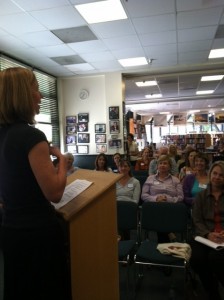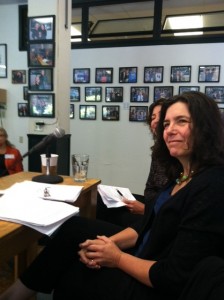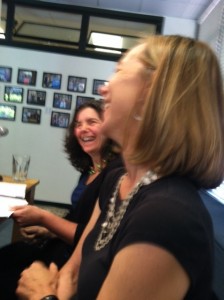So you want to start a writing group…
A hand popped up in the back of the room. “So where did you get your name?” asked a man last Sunday afternoon. Seated before him were four members of North 24th Writers, who’d gathered at Book Passage for a panel discussion on writing groups.
The occasion was the monthly meeting of the Marin branch of the California Writers Club, a group incorporated in 1913 that had Jack London as one of its first members. About forty people had decided to spend a few hours during a beautiful fall afternoon inside (shortly before the Giants won the World Series) to hear a discussion about writing groups, including how to form them, and the challenges and surprising side-benefits of creating your own work group.

Allison Hoover Bartlett, author of “The Man Who Loved Books Too Much” speaking at the California Writers Club’s October meeting
But the name of the critique group was puzzling to some. So here’s our story.
North 24th Writers is a long-established writing group made up of ten Bay Area women who’ve collectively published ten nonfiction books as well as hundreds of articles and essays in magazines, journals, and online publications. It is one of the Bay Area’s most successful writing groups as judged by its publishing record over the past decade.
Allison Hoover Bartlett, the author of The Man Who Loved Books Too Much and one of the founding members of North 24th Writers, explained the group’s name, which came from where its members live: all of us live north of San Francisco’s 24th Street.
Most of the group’s ten writers are based in San Francisco, including Bartlett and Susan Freinkel, author of Plastics: A Toxic Love Story and American Chestnut. But Frances Dinkelspiel, author of Towers of Gold, lives in Berkeley, and both Katherine Ellison, a Pulitzer Prize-winning journalist and author of five books, including Buzz and The Mommy Brain, and Julia Flynn Siler, author of Lost Kingdom and The House of Mondavi, live in Marin.
Bartlett was one of the writers who spun North 24th Writers out of Jane Anne Staw’s creative nonfiction work in the late 1990s. A few people came and went over the years, but since 2006, it’s been the same group of writers—all of whom began writing non-fiction, though now two have branched out into fiction. Over the years, we’ve learned a few lessons:
–Define your purpose early on. For North 24th Writers, our primary focus is on the craft of writing. We spend most of our time critiquing each other’s work, but allot some time to discuss the business of publishing, marketing, etc..
–Establish rules that everyone agrees. North 24th meets twice a month for two and a half hours each time. We sign up in advance to submit writing that the group will critique, submitting pieces no later than five days before the workshop.
–Choose the right partners. You might start by joining a critique class and then finding fellow students who you might want to continue working with. Don’t be discouraged if no one in your first class seems like a good fit—keep taking classes.

Susan Freinkel (front) author of Plastics: A Toxic Love Story, and Kathy Ellison, author of Buzz at the CWC’s October meeting at Book Passage
As Bartlett joked, taking a class to find compatible writing partners is “like going on a real date rather than browsing Match.com.”
-Read out loud. One of the best ways to find out how a piece of writing is working is to begin by reading it out loud to your group. You’ll immediately sense which rhythms and word choices are working—and those that aren’t.
–Sandwich your criticism. Start with the positive then move onto specific comments about what parts of the writing did and did not work, including specific suggestions on how to address those issues. Finish up with something positive.
-Friendships in a group can become a handicap. Over the years, the members of North 24th have become good friends. But the risk is that the group can become too safe and lose track of its original purpose. Be aware of this and don’t pull your punches (just sandwich them!) As Gil Mansergh, who attended the panel and has his own longstanding writing group observed, “even though you’re dealing with somebody’s babies, don’t be too nice!”
-Staying committed. Everyone is busy, but if the group becomes lackadaisical about scheduling meeting times, it can easily fall away. Block out your monthly workshop time together and keep those times sacrosanct.
Towards the end of the discussion, the James Beard award-winning cookbook writer Lorna Sass, thanked the panel for sharing its experiences with the group.
“The beauty of what your doing is that it dispels the myth that we should be doing this alone,” she observed. We agree. By creating our own community, we’ve helped each other become better writers.

Thank you for your wonderful presentation on Sunday. It was fun, informative and gave our member not only a view of what it takes to be success as a group, but to be a success as an individual. 24th Street Writers is a great support group!
Thanks, Barbara! I liked your fun story about workshopping an erotic scene (“That can’t be done…” and a week later, “Oh yes it can!”
We really appreciate the invitation to present to fellow writers of CWC. Many thanks and best,
Julie
I was there. What a powerhouse group of women! Having struggled with some book clubs in the past, I soaked up your thoughts about how to put together an alchemical (spinning things to gold) group of writers. Particularly helpful to be reminded that we tend to meet like-minded writers by working together in workshops and classes. You’re all writing amazing stuff. I look forward to following you individually and as a team. Thanks.
Thank you so much, Amanda. We really appreciated the opportunity to speak to the California Writers Club. It encouraged us to put some thought into why our group has worked over the years…
All best,
Julie
I loved this write-up. It is interesting to me that my writing group here on the East Coast came up with a lot of the same structures and guidelines, independently. I guess because they work.
Hello Julia,
I’m working on a story set in Hawaii, and will probably be inserting a few Hawaiian words and phrases just to give the narrative some credibility. Do you know of any online primers I might check that give translations on everyday words, phrases? I tried to find some translation websites but couldn’t find any with the option of English to Hawaiian.
Thank you,
Lee
Cocoa, FL
Hi Lee,
There’s a great site I’d recommend: http://wehewehe.org/. Good luck!
All best,
Julia